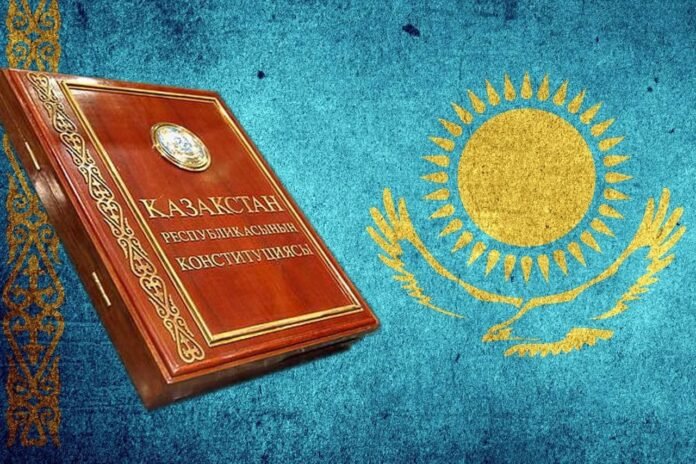Kazakhstan’s Constitution at 30: What Has Been Achieved?
ASTANA — When people voted in the 1995 national referendum (Aug. 30) to adopt a new Constitution, they laid the cornerstone of modern statehood. More than just a legal charter, the Constitution of Kazakhstan is marked by its humanist focus. Article 1 declares the country a democratic, secular, legal, and social state, in which the highest values are the individual, their life, rights, and freedoms.
For a country like Kazakhstan, which gained independence relatively recently, these provisions were far from mere formal declarations. They became a bedrock of domestic policy, legislative development, and state strategy in the years that followed.
Experts note that the constitutional recognition of human rights was a decisive step in the transition from an administrative-command system to a modern rule-of-law state.
Over nearly three decades, Kazakhstan has demonstrated a readiness to strengthen mechanisms for protecting citizens’ rights in a gradual yet consistent manner: open, institutionally formalized, and backed by international obligations. Human rights have thus acquired not only domestic significance but also become a marker of international legitimacy.
Expanding human rights safeguards :
Perhaps the most significant innovation of the reform that followed a nationwide referendum on June 5, 2022 was granting constitutional status to the Human Rights Commissioner. Ombudsman Artur Lastayev highlighted that with this decision, Kazakhstan has joined developed democracies where the activities of national human rights institutions are regulated by the Constitution and constitutional laws.
“This is a sign of democratic maturity. Reforms have made human rights protections more accessible, including the right of citizens to appeal directly to the Constitutional Court,” Lastayev explained.
The ombudsman’s role has expanded from reviewing complaints to proactive monitoring of detention facilities, legislative initiatives, and legal education. In 2024, nearly 800 visits to prisons, detention centers, and special institutions were carried out, far exceeding previous years.
Regional representatives of the ombudsman now operate nationwide. This institutional presence has fueled a surge in public trust, as annual appeals have grown from 1,800 to nearly 7,000 in just a few years.
According to Lastayev, this reflects both rising legal awareness and stronger trust in institutions. Legislative proposals from the ombudsman’s office are increasingly shaping national policy. Among the most notable is the new law on combating domestic violence, written in accordance with ombudsman recommendations, which now stands as a landmark in Kazakhstan’s legal landscape.
Rule of law through constitutional change:
The Constitution has proven to be flexible, evolving in response to new challenges. The transformative change came with the referendum in June 2022, when citizens endorsed sweeping reforms aimed at democratization, judicial modernization, and the reinforcement of the principle of law and order.
The judiciary was a primary beneficiary. As Chief Justice Aslambek Mergaliyev noted, according to the Constitution, everyone has the right to judicial protection of their rights and freedoms.
“Therefore, it is crucial that every citizen is confident in the fairness of the court, where they can truly find both protection and truth. The rule of law in all spheres of life must become the foundation of Kazakhstan’s progressive development,” he said.
Digitization has advanced rapidly. Over 80% of pre-trial investigations are now conducted electronically, and 90% of investigative actions are video-recorded, ensuring transparency. The Ministry of Justice has also broadened legal access through the People’s Lawyer campaign and the expansion of its online Legal Cabinet.
A regional perspective:
Interestingly enough, Kazakhstan’s path mirrored broader Central Asian trends.
First Deputy Director of Uzbekistan’s National Center for Human Rights Mirzatillo Tillabayev noted in the first two decades of this century alone, the world adopted 57 new constitutions, and Central Asian states have not stood aside. He stated that their fundamental laws are evolving toward greater openness, social responsibility, and alignment with international norms. He highlighted the constitutionalization of Ombudsperson institutions in both Kazakhstan and Uzbekistan as key evidence of this shift. He also noted the growing impact of globalization.
“The development of our constitutions shows the successful incorporation of international law into national legislation.
Kazakhstan, in particular, is characterized by broad citizen participation, transparency, openness, and inclusivity — hallmarks of democratic constitutional processes,” he said.
Tillabayev warned, however, that digitization poses new challenges, one that will require collaborative effort from the countries’ expert communities.
“The rapid spread of AI, big data, and digital governance demands fresh approaches to human rights protection. Our expert communities must work together on issues of digital security, personal data protection, and the ethical use of AI in governance and justice,” he said.
The Constitution has proven both durable and adaptive. Nearly three decades after its adoption, it remains centered on the principle that the highest value is the individual, their rights, and their dignity. The 2022 reforms in particular cemented the idea that sovereignty belongs to the people, while anchoring the rule of law and human rights protections in the country’s political DNA.
As the nation navigates the digital era and a shifting global landscape, its greatest hope lies in the Constitution’s continued role: not only as the foundation of statehood, but also as a reflection of the society’s aspirations.







